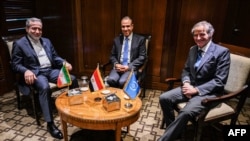Iran has cast doubt on a reported pause in new US sanctions, demanding guarantees and verifiable relief as it reportedly is preparing to reject a nuclear proposal from Washington involving a regional fuel consortium.
Citing a source close to the Trump administration, the Wall Street Journal on June 1 said White House press secretary Karoline Leavitt had issued a directive to top officials at the State Department, Treasury Department, and National Security Council to "pause all new sanctions activity toward Iran."
If true, the move signals a potential shift in Washington’s approach as high-stakes nuclear negotiations with Tehran continue.
Asked about the report, Iran’s Foreign Ministry spokesman Esmail Baqaei said Iran has "yet to see any change in the US position on sanctions" and insisted that only the lifting of sanctions -- guaranteed and verifiable -- would be acceptable to Tehran.
"We want to guarantee that the sanctions are effectively lifted," Baqaei said in his weekly press briefing on June 2, adding that the US has so far avoided clarifying its intentions.
He emphasized that sanctions relief is a “fundamental” requirement for any nuclear agreement and that Iran would not accept vague promises or temporary measures.
Preparing ‘Negative’ Response To US Proposal
Meanwhile, Iranian Foreign Minister Abbas Araqchi on June 1 said Tehran is “preparing a response” to a US proposal for an agreement on Iran’s nuclear deal.
The proposal, which Araqchi says includes “elements” of a deal, was delivered to Tehran last week by Oman’s Foreign Minister Badr Albusaidi, who has mediated five rounds of talks between the Iran and the United States since April.
Axios and the New York Times say Washington has proposed that Iran end all uranium enrichment on its soil in exchange for joining a regional nuclear fuel consortium with Arab states and the United States, under strict international oversight.
The plan aims to limit Iran’s ability to develop weapons-grade material. The main obstacle is Iran’s insistence on maintaining some domestic enrichment for civilian use, which the White House opposes.
Reuters on June 2 quoted a senior Iranian diplomat as saying that Tehran is “drafting a negative response” because Washington’s position on enrichment “remains unchanged” and there is “no clear explanation regarding the lifting of sanctions.”
Separately, Russia’s state-run television channel RT cited an Iranian source as saying that the proposal was “out of touch with reality” and was viewed by Tehran as “extremely far” from what might be considered a “fair and realistic” basis for an agreement.
In its latest report on May 31, the International Atomic Energy Agency (IAEA) said Iran had amassed 408.6 kilograms of uranium enriched up to 60 percent as of May 17, up from just under 275 kilograms in the IAEA's last quarterly report in February.
According to the IAEA, about 42 kilograms of 60 percent enriched uranium is theoretically enough to produce one atomic bomb if enriched further to 90 percent.
The IAEA report said Iran is now "the only non-nuclear-weapon state to produce such material," which it said was of "serious concern."
Ali Vaez, Iran Program Director at the International Crisis Group, said there are only two possible reasons for Iran’s production of highly enriched uranium: to build a bomb -- which US intelligence currently believes Tehran is not pursuing -- or to gain leverage in nuclear negotiations.
“If you’re looking for leverage, you need to play your card at the right time,” he told RFE/RL’s Radio Farda. “Insisting too rigidly on a maximalist position isn’t expedient.”
Speaking to reporters in Cairo, Egypt after meeting IAEA Director General Rafael Grossi, Araqchi Tehran will not accept an agreement with the United States that aims to "deprive Iran of its peaceful activities."
He insisted that Iran "has nothing to hide" and said Tehran is "prepared to provide" assurances that it does not want to weaponize its nuclear program.










